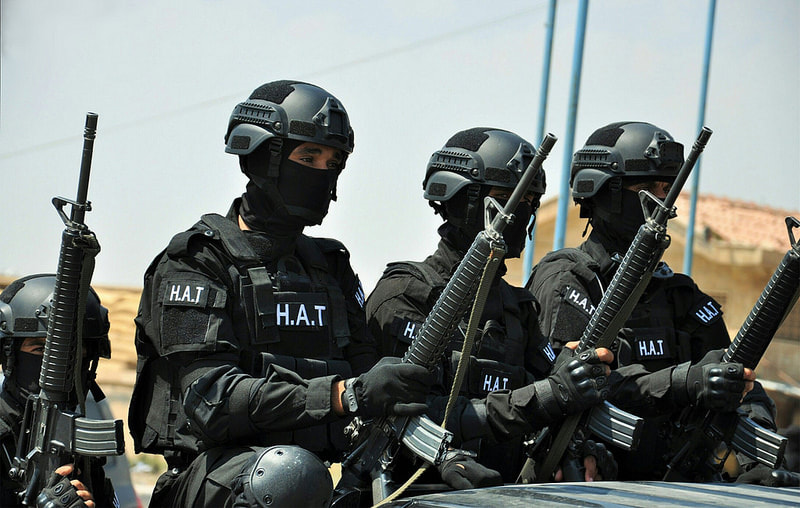| “I was about to hang up when I heard the receiver go up on the other end of the line. ‘Hello,’ said a strong, clear voice. ‘Is this Howard?’ I asked. ‘Yes,’ said the voice, ‘this is Howard. What’s the last name of the party you want?’ Breathless, I strained my ears to catch the sound of shooting, but there was only silence. It seemed as though the man at the other end of the line had clapped his hand over the receiver to shut out the |
| | sound. Then the voice, as if stalling for time, repeated: ‘What’s the last name of the man you want?’ ‘Unruh,’ I said. ‘Who are you and what do you want?’ ‘I’m a friend and I want to know what they’re doing to you.’ ‘Well, they haven’t done anything to me yet, but I’m doing plenty to them.’ ‘How many have you killed?’ ‘I don’t know yet — I haven’t counted ‘em, but it looks like a pretty good score.’ ‘Why are you killing people?’ ‘I don’t know. I can’t answer that yet — I’m too busy. I’ll have to talk to you later. A couple of friends are coming to get me.’ With that last statement, there was a click on the other end of the phone. The man had hung up.” —Associated Press Howard Unruh, described by the news media as a 28-year-old “Bible reading war veteran” who regularly attended church, walked around his neighborhood in Camden, N.J., shooting people at random with a German Lugar pistol. He killed 13 people and wounded three others in only 12 minutes. A Wikipedia account says first, he fired at a bakery truck driver and missed. Then he walked into a barbershop and shot two of the five people there, leaving the others unharmed. Later, he killed a man in front of a pharmacy, among others; he killed another in his car as he slowed to look at what was happening. He killed the wife of a tailor in her husband’s shop. His youngest murder victim was 2; the oldest was 68. After a while, people had begun to lock their doors and hide. Unruh could hear the sirens of approaching police cars, so he went back to the second-floor apartment he shared with his mother and held off more than 60 police officers in a shootout. It was during this when Philip Buxton, a reporter for the Camden Evening Courier, took a chance and called Unruh’s home, resulting in the above conversation, as reported the next day in the Chicago Tribune and other newspapers. The date was Sept. 6, 1949. Anyone who tells you random mass shootings are a recent phenomenon in the United States doesn’t know history. Unruh certainly wasn’t the first. A Wikipedia list of such things reveals, among other things, that Gilbert Twigg killed nine and injured 25 in Winfield, Kan., on Aug. 13, 1903. The next day’s headline in the Winfield Daily Free Press said, “Madman’s Awful Work,” with the subhead, “Streets of the city flow with the blood of his many victims.” Another subhead said, “Vengeance was his cry.” On March 1, 1889, Jim Jumper killed at least seven and injured one more in Okeechobee, Fla. The list goes on and on. Not all involved firearms. No, these kinds of things are not new, but they are happening with greater frequency today than ever before. Debates rage about gun control and other laws, but those things might treat the periphery of this problem or make it slightly harder to commit such crimes, but they wouldn’t help us understand, predict or prevent them. On Monday, authorities said Devin Patrick Kelley, the man believed responsible for killing 26 worshippers Sunday at a small-town church in Texas had a history of domestic violence, including an ongoing dispute with a relative who had attended the church. “What you typically see in active shooter attackers is an avenger-type mentality,” Peter Blair, a criminal justice professor at Texas State University and author of a study examining 160 such incidents, told the Washington Post. “They’re people who believe they’ve been wronged in some way. They get angrier and angrier and they plan the attack as a way to get people to recognize their issue.” That was the case with Howard Unruh back in 1949. He felt people in his neighborhood had been picking on him. He wanted revenge, even though he seemed to choose his victims randomly. Unruh lived in a psychiatric hospital until his death in 2009. But his words to a reporter who asked him 68 years ago why he was killing people seem to sum up a grieving nation’s frustrated efforts to confront this growing plague today. “I don’t know.” |


 RSS Feed
RSS Feed

